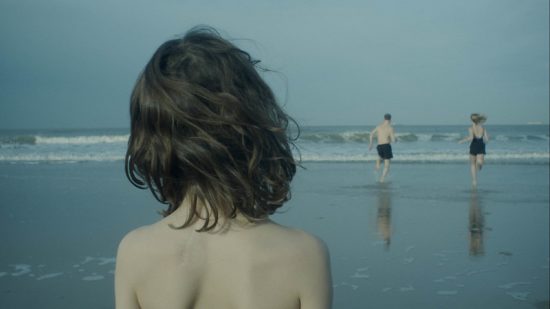Sundance 2021 Review: Human Factors – “An interesting experiment in perspective”

Wanja Valentin Kube, Mark Waschke, and Jule Hermann appear in Human Factors by Ronny Trocker, an official selection of the World Cinema Dramatic Competition at the 2021 Sundance Film Festival. Courtesy of Sundance Institute | photo by Klemens Hufnagl.
Husband and wife co-owners of an advertising agency Jan (Mark Waschke) and Nina (Sabine Timoteo) aren’t seeing eye to eye. Jan has just had interest from a political party to help handle the communications for their election campaign – they want something provocative and devoid of empathy to help them win. However, Nina is upset, never wanting to enter into the political spectrum with their business. With the public announcement of their company’s involvement, their building gets vandalized, only escalating tensions in what appears to be an increasingly strained relationship. To try and find reprieve, the pair take their children Emma (Jule Hermann) and Max (Wanja Valentin Kube) as well as pet rat Zorro to their holiday home in Belgium.
Director Ronny Trocker always keeps you off balance while watching this film, shifting not only in perspective but also time, and not revealing that a move has happened until you’re already deeper into the story. It’s a complex structure for a narrative that demands your full attention. Blink and you might miss a clue that prevents confusion. The film even shifts language, with characters seamlessly transitioning between French and German. Cameras smartly move differently depending on which character is in control of the narrative at a specific time, creating more atmosphere within their respective storylines. This even includes a view through the eyes of Zorro the rat. In fact, the most truthful perspective in Human Factors comes from the one cast member who is not human at all.
In addition to the environmental atmosphere, the cast does an excellent job of holding tension and frustration through each of their characters, building mounting internal pressure. Led by great performances from Waschke (who reminded me of a German Jude Law) and Timoteo, who share most of the screen time here, each cast member excels at creating their own unique glimpses at the world around them. Yes, even Zorro.
The way that each of us as humans manipulates our own realities based on our beliefs is an intriguing premise to explore. Yet, while Human Factors is an interesting experiment in perspective and how your view of the world (both from a physical and psychological standpoint) skews the way you see it, the finale of the film falls short. Trocker does such good work in building up this sense of foreboding throughout but never follows through with a conclusion that satisfies this anticipation. In trying to remain ambiguous, the filmmaker loses the expectation of an imaginary climax, which never truly amounts to much at all.










